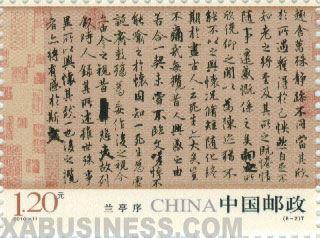It's fun to be drunk, is what i hear, you go clubbing you get drunk, you get sad you get drunk, you want to have a good time and do something crazy you get drunk. But imagine if getting drunkn of wine inspired you to wirte someof the best poerty the literate world has ever seen. Well thats the story of the Orchard Pavillion. It all started in ancient China after the colapse of the Jin Dynasty in 316 BC, and China was in peril. The political system had broken down and now it was all out war to see who would be dominant. Most would be scared as hell, but some people wanted to forget about the state of the world and just wirte poetry about what was going through their minds. At the Orchard Pavillion, some poets including government ministers showed up to get drunk and write beautiful poerty. A famous quote from a poet is " it is easier to write poetry when im drunk then when im sober". I related this quote to the scene in Social Network when Mark was intoxicated but he still managed hacked Harvard and created facesmash.com. Wang Xizhi was a master poet contributed a famous preface and was known most for his art in Chinese calligraphy. These poets sat outside, tasted wine, and were inspired by the beauty of Nature showing teaching them that the worlds hatered and violence mainly comes from man kind its self. http://hoc10s2.wikispaces.com/file/view/Orchid%20Pavilion.pdf
 Chinese Calligraphy
Chinese Calligraphy
 Empress Wu
Empress Wu
